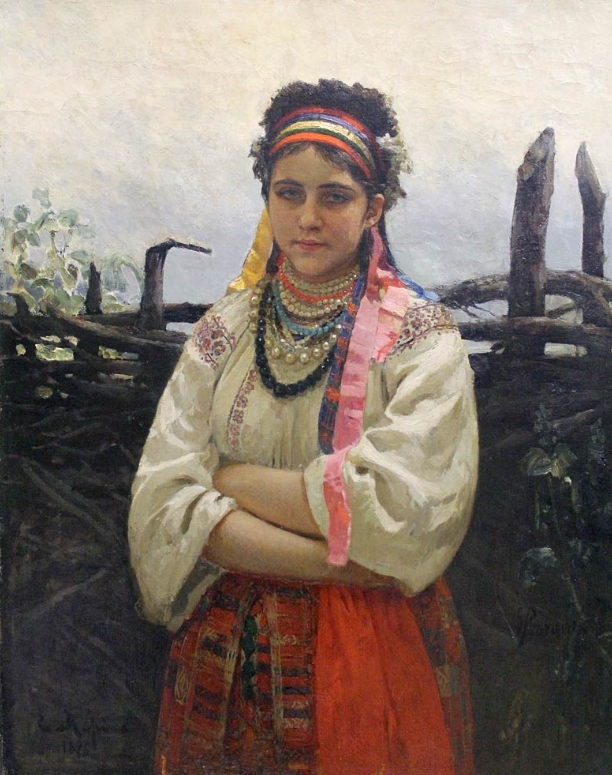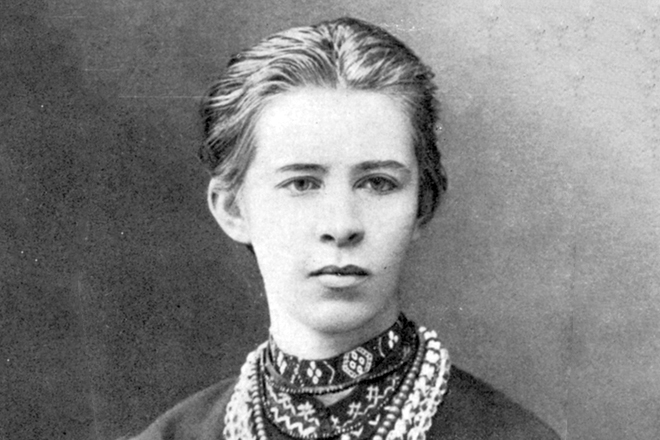tijd
in
puppet_djt
We the people

Картина Репина "Украинка у тына" хранится в Минске.
Между тем сайт Метрополитен-музея в Нью-Йорке заменил "Illia Repin - Russian" на "Illia Repin - Ukrainian" с пояснением "Repin was born in the rural Ukrainian town of Chuhuiv (Chuguev) when it was part of the Russian Empire. He went on to become a major progressive painter." https://www.metmuseum.org/art/collection/search/437442


Больше известна другая картина на украинскую тему, приобретенная в 1892 императором Александром Третьим. Вторая, улучшенна версия картины хранится в Харьковском художественном музее и была спасена из-под обстрелов в 2022.
В сюжете «Запорожцев» интересно то, что письмо казаков в ответ султану написано коллективно и от лица народа - того, что в американской традиции называется "we the people".
"I think what is significant and different about our system is that every country has a constitution, and most constitutions or practically all of the constitutions in the world are documents in which the government tells the people what the people can do. Our Constitution is different, and the difference is in three words; it almost escapes everyone. The three words are, "We the people." Our Constitution is a document in which we the people tell the Government what its powers are. And it can have no powers other than those listed in that document. But very carefully, at the same time, the people give the government the power with regard to those things which they think would be destructive to society, to the family, to the individual and so forth -- infringements on their rights. And thus, the government can enforce the laws. But that has all been dictated by the people."
https://www.reaganlibrary.gov/archives/speech/remarks-and-question-and-answer-session-students-and-faculty-moscow-state

В те же годы, когда Илья Репин работал над своей большой картиной, приезжая для этого на родину, Леся Украинка писала поэму "Роберт Брюс, король шотландський", в которой от имени "we the people" к своему королю обращаются шотландцы:
«З ласки бога й народу обраний,
Наш королю! вітаєм тебе!
Ми підданими влади твоєї
Признаємо охоче себе.
Коли ти боронитимеш волю
Й самостійність народу твого,
Ми повік шанувать тебе будем
І любити, як друга свого.
Ти кликнеш на війну, ми зберемось
Під твою корогву всі гуртом,
Ми готові тобі і країні
Послужити мечем і щитом.
Та коли ти забудеш про справу
Честі й волі народу свого,
Схочеш інші, багатшії землі
Прилучати до панства твого,
Ми не підем тоді за тобою,
Щоб чужого добра здобувать,
Нам не тісно у рідній країні,
Нам не треба в чужу мандрувать!
Коли ти серед панських розкошів
Продаватимеш люд свій панам,
Ми самі боронити потрапим
Ті права, що належаться нам.
А коли ти англійській короні
Віддаси королівство своє, -
Знай, що в тую ганебну годину
Пропаде й панування твоє.
Ми тебе королем увінчали,
Ми тебе й розвінчаєм сами,
І коли проти нас ти повстанеш,
Проти тебе повстанемо ми.
Дай нам, боже, радіти довіку,
Що обрали тебе в королі,
Хай цвіте при тобі та пишає
Вільна воля в шотландській землі!»
https://www.l-ukrainka.name/uk/Poems/RobertBruce.html
Украинка поэтическим языком пересказала Арбротскую декларацию из 1320 - один из самых известных политических документов в истории. В коллективной декларации, написанной в оригинале на латыни и обращенной к Римскому папе, шотландцы явным образом провозглашают принцип "consent of the governed", позже проникший в американскую Декларацию независимости. Выбирая Роберта своим королем, они согласны подчиняться его руководству и следовать за ним в бою - но только до тех пор, пока он защищает их права. Если король предаст их и пойдет на соглашение с английскими захватчиками, шотландцы обещают его свергнуть и продолжать бороться за свободу.
"Him, too, divine providence, the succession to his right according to our laws and customs which we shall maintain to the death, and the due consent and assent of us all have made our prince and king. To him, as to the man by whom salvation has been wrought unto our people, we are bound both by his right and by his merits that our freedom may be still maintained, and by him, come what may, we mean to stand.
Yet if he should give up what he has begun, seeking to make us or our kingdom subject to the King of England or the English, we should exert ourselves at once to drive him out as our enemy and a subverter of his own right and ours, and make some other man who was well able to defend us our King; for, as long as a hundred of us remain alive, never will we on any conditions be subjected to the lordship of the English. It is in truth not for glory, nor riches, nor honours that we are fighting, but for freedom alone, which no honest man gives up but with life itself."
https://www.scottisharchivesforschools.org/WarsOfIndependence/Unit09DeclarationOfArbroath.asp
VIDEO: US President Joe Biden visits the Heavenly Hundred Memorial in Kyiv with President Volodymyr Zelensky during his surprise visit to Ukraine's capital pic.twitter.com/ibdWxZM4dN
- AFP News Agency (@AFP) February 21, 2023
«А коли ти англійській короні
Віддаси королівство своє, -
Знай, що в тую ганебну годину
Пропаде й панування твоє.
Ми тебе королем увінчали,
Ми тебе й розвінчаєм сами,
І коли проти нас ти повстанеш,
Проти тебе повстанемо ми.»
В качестве поэтической рифмы принцип "consent of the governed" был реализован много лет спустя во время украинской Революции Достоинства, а место ста шотландцев, готовых умереть за свободу ("as long as a hundred of us remain alive") заняла «небесная сотня.

То, что Арботская декларация вдохновила американскую Декларацию независимости, подчеркивается в единогласно принятой в 1998 резолюция Сената, которая призвала отмечать годовщину этой декларации и вклад шотландского народа в создание США как Национальный День Тартана.
Designating April 6 of each year as "National Tartan Day" to
recognize the outstanding achievements and contributions made by
Scottish Americans to the United States.
Whereas April 6 has a special significance for all Americans, and especially
those Americans of Scottish descent, because the Declaration of
Arbroath, the Scottish Declaration of Independence, was signed on April
6, 1320 and the American Declaration of Independence was modeled on that
inspirational document;
Whereas this resolution honors the major role that Scottish Americans played in
the founding of this Nation, such as the fact that almost half of the
signers of the Declaration of Independence were of Scottish descent, the
Governors in 9 of the original 13 States were of Scottish ancestry,
Scottish Americans successfully helped shape this country in its
formative years and guide this Nation through its most troubled times...
https://www.congress.gov/bill/105th-congress/senate-resolution/155/text
Пришлось, однако, ждать 10 лет, пока к инициативе подключилась Палата представителей и Белый дом. Честь провозгласить первый день тартана выпала в апреле 2008 Джорджу Бушу, в крови которого вместе с английской и ирландской была и небольшая доля шотландской.
"The Declaration of Arbroath, the Scottish Declaration of Independence signed in 1320, embodied the Scots' strong dedication to liberty, and the Scots brought that tradition of freedom with them to the New World. Sons and daughters of many Scottish clans were among the first immigrants to settle in America, and their determination and optimism helped build our Nation's character. Several of our Founding Fathers were of Scottish descent, as have been many Presidents and Justices of the United States Supreme Court. Many Scottish Americans, such as Andrew Carnegie, were great philanthropists, founding and supporting numerous scientific, educational, and civic institutions."
https://georgewbush-whitehouse.archives.gov/news/releases/2008/04/20080404-9.html

Если отцы-основатели США неявно вдохновлялись шотландскими событиями пятивековой давности, то шотландцев времён короля Роберта на борьбу за независимость явным образом вдохновляли события пятнадцативековой давности - восстание Маккавеев в древнем Израиле:
"King and lord, the lord Robert. He, that his people and his heritage might be delivered out of the hands of our enemies, bore cheerfully toil and fatigue, hunger and peril, like another Maccabaeus or Joshua. Him, too, divine providence, the succession to his right according to our laws and customs which we shall maintain to the death, and the due consent and assent of us all have made our prince and king. To him, as to the man by whom salvation has been wrought unto our people, we are bound both by his right and by his merits that our freedom may be still maintained, and by him, come what may, we mean to stand."
И действительно - идея народного самоопределения через коллективную судьбу ("we the people") и отделение правительства от народа ("consent of the governed") безусловно относится к традициям еврейского народа, со временем влившимся в христианство.

Лорд Джонатан Сакс, бывший главный раввин Великобритании, объяснял смысл празднования Хануки не в военной победе Маккавеев, которая в историческом плане оказалась недолговечной (пришла Римская империя и закатала всех в асфальт), а в неугасаемости огня надежды, который продолжает гореть даже в самые беспросветные времена. Римская империя, как и многие другие до и после неё, развалилась, а еврейский народ остался.
"It began as the simple story of a military victory, the success of Judah the Maccabee and his followers as they fought for religious freedom against the repressive rule of the Syrian-Greek emperor Antiochus IV. Antiochus, who modestly called himself Epiphanes, “God made manifest”, had resolved forcibly to hellenise the Jews.
He had a statue of Zeus erected in the precincts of the temple in Jerusalem, ordered sacrifices to be made to pagan gods, and banned Jewish rites on pain of death. The Maccabees fought back and within three years had reconquered Jerusalem and rededicated the Temple. That is how the story is told in the first and second books of Maccabees.
However, things did not go smoothly thereafter. The new Jewish monarchy known as the Hasmonean kings themselves became hellenised. They also incurred the wrath of the people by breaking one of the principles of Judaism: the separation between religion and political power. They became not just kings but also high priests, something earlier monarchs had never done.
Even militarily, the victory over the Greeks proved to be only a temporary respite. Within a century Pompey invaded Jerusalem and Israel came under Roman rule. Then came the disastrous rebellion against Rome (66-73), as a result of which Israel was defeated and the Temple destroyed. The work of the Maccabees now lay in ruins.
Some Rabbis at the time believed that the festival of Chanukah should be abolished. Why celebrate a freedom that had been lost? Others disagreed, and their view prevailed. Freedom may have been lost but not hope.
That was when another story came to the fore, about how the Maccabees, in purifying the Temple, found a single cruse of oil, its seal still intact, from which they relit the Menorah, the great candelabrum in the Temple.
Miraculously the light lasted eight days and that became the central narrative of Chanukah. It became a festival of light within the Jewish home symbolising a faith that could not be extinguished. Its message was captured in a phrase from the Prophet Zechariah: “Not by might nor by power but by My spirit, says the Lord Almighty.”
I have often wondered whether that is not the human story, not just the Jewish one. We celebrate military victories. We tell stories about the heroes of the past. We commemorate those who gave their lives in defence of freedom. That is as it should be. Yet the real victories that determine the fate of nations are not so much military as cultural, moral and spiritual.
In Rome, the Arch of Titus was erected by Titus’s brother Domitian to commemorate the victorious Roman siege of Jerusalem in the year 70. It shows Roman soldiers carrying away the spoils of war, most famously the seven-branched Menorah. Rome won that military conflict. Yet its civilisation declined and fell, while Jews and Judaism survived."
https://www.rabbisacks.org/archive/the-festival-of-lights-that-signifies-an-inextinguishable-faith/

А тому народу, который не смог отлепить себя от правительства, чтобы обрести собственный голос, и идёт по историческому пути вымерших деревних народов и империй, следует прислушаться к бессмертным словам:
«Та коли ти забудеш про справу
Честі й волі народу свого,
Схочеш інші, багатшії землі
Прилучати до панства твого,
Ми не підем тоді за тобою,
Щоб чужого добра здобувать,
Нам не тісно у рідній країні,
Нам не треба в чужу мандрувать!»